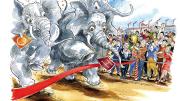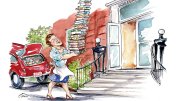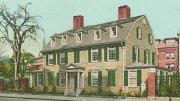1927
The debating team has won four of six matches during a spring-break tour of the Middle West, the editors note. In each debate, Harvard supported the affirmative side of the question: “Resolved, that the American College is a Failure.”
1952
“Korea—symbol of the undeclared war between East and West—continues to dominate the academic year 1951-52,” with the University “steering a course somewhere between total mobilization and business as usual”; 40 percent of the freshmen are enrolled in the army, navy, and air force ROTC programs.
1962
Joseph Russin ’64 guides the four-plus-ton Sonita to a sweepstakes trophy for Harvard at the first Intercollegiate Elephant Race at Orange County State College in Fullerton, California.
1972
East Asian studies becomes Harvard’s newest concentration.…Mexican-American and Puerto Rican students schedule a conference to explore problems in implementing a Chicano-Boricua studies program at Harvard.
1997
The Faculty of Arts and Sciences adds a new quantitative reasoning course requirement to the Core Curriculum, replacing the former test-out option.
Harvard’s first chair devoted exclusively to environmental issues is endowed by Gilbert Butler Jr. ’59 to honor the memory of his father.
More than 300 people gather in the Yard for the unveiling of a plaque on Matthews Hall commemorating Caleb Cheeshahteaumuck, A.B. 1665, and the other four initial Native American students at Harvard’s Indian College.
2002
Following a year of debate and data-gathering, the Faculty of Arts and Sciences makes it easier for undergraduates to study abroad, and more difficult for them to earn academic honors.









